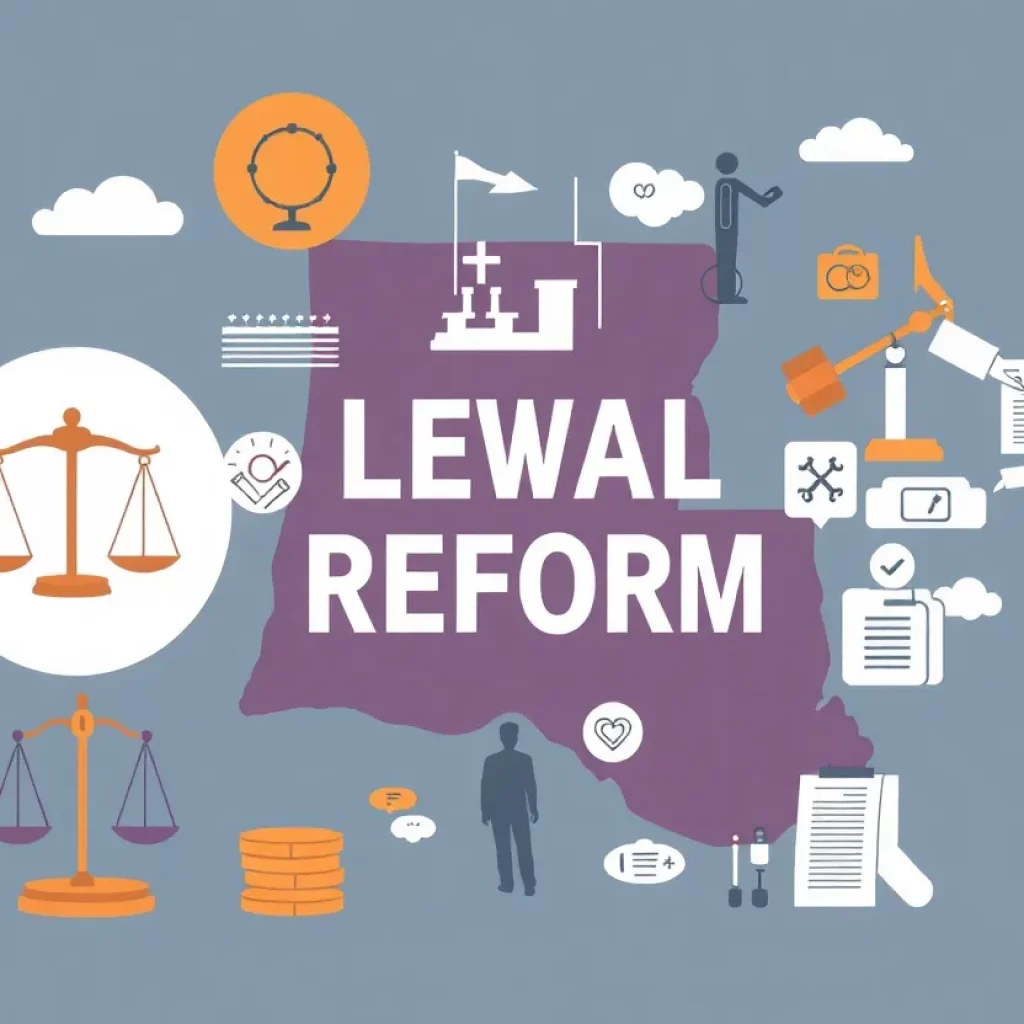News Summary
In response to rising insurance rates, Louisiana lawmakers have advanced six bills aimed at reforming the state’s personal injury litigation system. The proposed legislation seeks to address issues such as fault determination, medical expense presentation, and notification requirements for plaintiffs. Supporters argue that these reforms will help reduce insurance premiums, while critics raise concerns about the potential impact on claimants’ rights. Ongoing debates suggest that the legal landscape in Louisiana could see significant changes amid varying opinions from lawmakers and stakeholders.
Louisiana Lawmakers Advance Six Bills Targeting Personal Injury Lawsuits Amid Insurance Rate Crisis
In a dramatic move that highlights the ongoing debate over personal injury litigation and soaring insurance costs, Louisiana lawmakers have advanced six crucial bills aimed at reforming the state’s tort system. The House Civil Law Committee deliberated on these bills, with discussions centering around perceived flaws in the legal framework that purportedly escalate insurance expenses.
Republican Representative Jay Gallé from Mandeville described the proposed legislation as an “opening pitch” for tort reform, signaling a robust effort to reshape the landscape of personal injury claims in the state. With Louisiana boasting the third-highest auto insurance rates in the nation, there’s an urgent call for legislative action.
The Proposed Changes
Among the most talked-about bills is House Bill 431, sponsored by Rep. Emily Chenevert of Baton Rouge. This legislation seeks to amend Louisiana’s comparative fault statute by limiting damage recovery for parties found to be 51% or more at fault in a given accident. The committee passed this proposal with an 11-4 vote along party lines, reflecting clear partisan divisions on this issue.
Chenevert frames the bill as a matter of “common sense,” arguing that those who are primarily at fault should not receive damages. However, the legislation has drawn criticism from members such as Rep. Chad Brown from Plaquemine. He argues that it establishes a double standard where defendants retain rights to proportional liability while plaintiffs are effectively denied recovery if deemed mostly at fault.
Another significant bill, House Bill 34, initiated by Rep. Brian Glorioso from Slidell, aims to revolutionize the way medical expenses are considered in court. This bill would permit parties to present evidence of actual medical expenses incurred rather than merely what has been billed, addressing concerns that inflated medical costs are skewing jury awards.
Additional Legislative Proposals
The committee also passed House Bill 443, a measure compelling plaintiffs to notify defendants of their intent to file a lawsuit within 10 days of hiring an attorney. This provision aims to streamline the legal process and enhance communication between parties.
Furthermore, House Bill 434 would place limitations on bodily injury claims for plaintiffs lacking auto insurance at the time of an accident, preventing them from recovering any amount up to the first $100,000 in damages. This proposal has the potential to significantly alter the landscape for uninsured drivers seeking compensation.
House Bill 450 seeks to reverse the Housley presumption, a legal precedent from a 1991 Louisiana Supreme Court decision that currently favors plaintiffs in personal injury lawsuits. Meanwhile, House Bill 291 aims to extend the timeframe for filing wrongful death lawsuits from one year to two years, providing additional leeway for families seeking justice.
The Bigger Picture
This flurry of legislative activity surfaces amid a broader climate of concern regarding insurance rates in Louisiana. Proponents of the proposed tort reforms assert that excessive litigation is a primary driver of high insurance premiums. However, critics point to a history of previous tort reform measures failing to yield substantial reductions in these costs.
With a diverse range of influences contributing to Louisiana’s elevated auto insurance rates—including market conditions and litigation complexities—Governor Jeff Landry remains vocal about the critical necessity to tackle these issues. Yet, he faces diverse opinions among lawmakers and stakeholders, complicating the path forward.
Public sentiment appears to be divided, with industry advocates calling for stringent reforms while legal professionals caution against restricting the rights of claimants and any potential undermining of fair compensation. In light of these discussions, additional hearings on insurance matters are anticipated, and a special session centered on insurance reforms may be called before the regular 2025 legislative session.
With Insurance Commissioner Tim Temple urging further legislative action in response to soaring auto insurance costs—especially following the Governor’s veto of certain reform proposals—the stage is set for a continued and contentious debate over Louisiana’s insurance and legal landscape.
Deeper Dive: News & Info About This Topic
HERE Resources
Talc Mining Company Establishes Asbestos Trust Fund for Victims
Barretts Minerals Establishes Asbestos Trust Fund Amid Legal Struggles
Accident Victims: Know Your Rights and Seek Proper Legal Help
Florida Lawyer Sparks Legal Battle Over Immigration Policies
Latin Lawyer’s Annual Awards Spotlight Pro Bono Initiatives
Lawyers Seek Justice After Death of Former Power Station Worker
South Carolina Begins Construction of New Comprehensive Cancer Hospital
New IT Guide for Personal Injury Law Firms in West Los Angeles
The Haunting Legacy of Asbestos Exposure: Louisiana’s Oil Refinery Workers Impacted
Louisiana Lawyer Urges Mesothelioma Victims to Take Action
Additional Resources
- Louisiana Illuminator
- Wikipedia: Tort Reform
- The Advocate
- Google Search: Louisiana car insurance rates
- Business Insider
- Google Scholar: Louisiana insurance reform
- Encyclopedia Britannica: Insurance
- NOLA.com
- Google News: Louisiana insurance debate
Author: STAFF HERE CHARLESTON
The CHARLESTON STAFF WRITER represents the experienced team at HEREcharleston.com, your go-to source for actionable local news and information in Charleston, Charleston County, and beyond. Specializing in "news you can use," we cover essential topics like product reviews for personal and business needs, local business directories, politics, real estate trends, neighborhood insights, and state news affecting the area—with deep expertise drawn from years of dedicated reporting and strong community input, including local press releases and business updates. We deliver top reporting on high-value events such as the Spoleto Festival USA, Charleston Wine + Food Festival, and the MOJA Festival. Our coverage extends to key organizations like the Charleston Metro Chamber of Commerce and the Charleston Museum, plus leading businesses in tourism and maritime industries that power the local economy such as South Carolina Ports Authority and the Charleston Visitor Center. As part of the broader HERE network, including HEREaiken.com, HEREbeaufort.com, HEREchapin.com, HEREcharleston.com, HEREclinton.com, HEREcolumbia.com, HEREgeorgetown.com, HEREgreenwood.com, HEREgreenville.com, HEREhiltonhead.com, HEREirmo.com, HEREmyrtlebeach.com, HEREnewberry.com, HERErockhill.com, HEREspartanburg.com, HEREaustin.com, HEREcollegestation.com, HEREdallas.com, HEREhouston.com, and HEREsanantonio.com, we provide comprehensive, credible insights into South Carolina's dynamic landscape.










